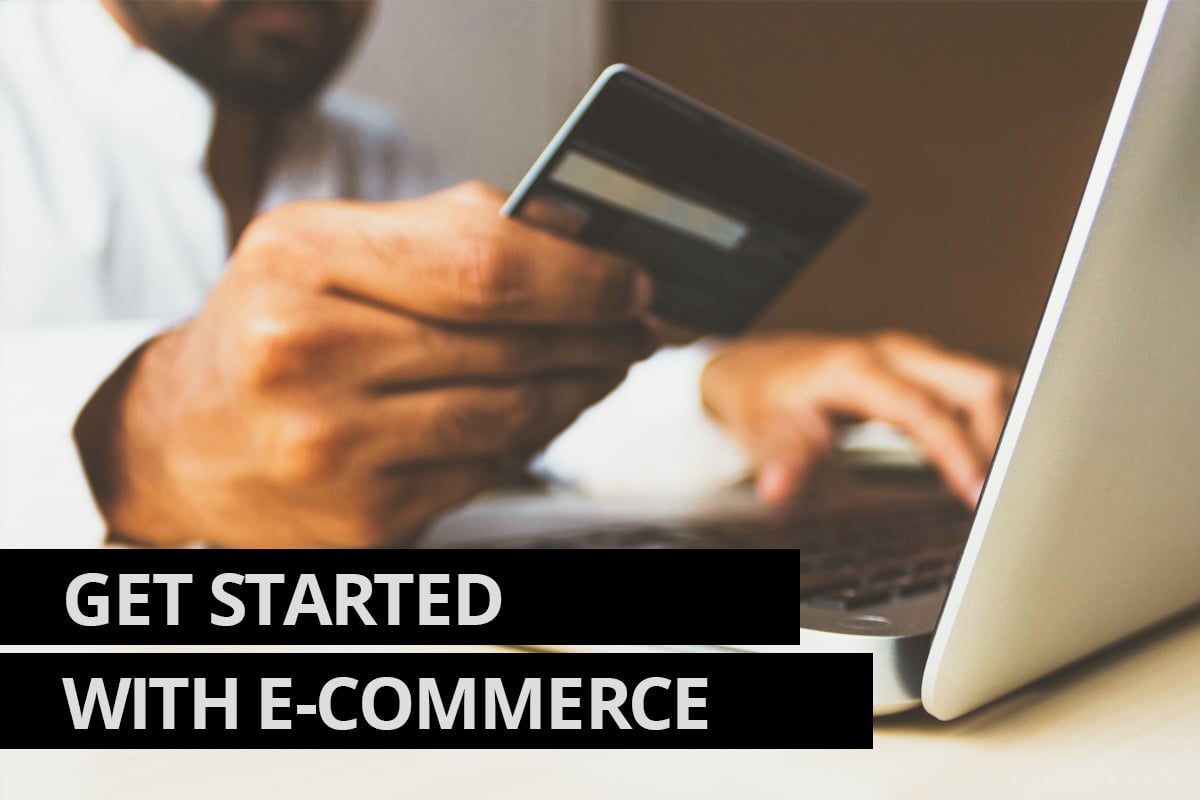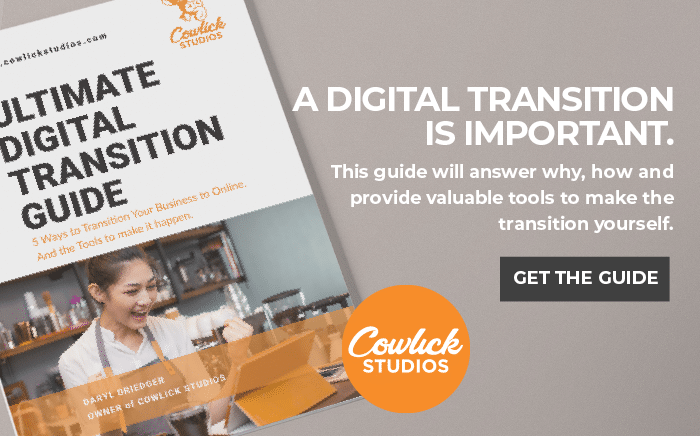Want to Sell Online?
Ready to start selling products online? Starting an e-commerce business can be intimidating. The good news is it isn’t as complicated as it first appears. Thanks to a variety of services that can help you design and open a digital store in 15-30 minutes. However, you will still have important decisions to make along the way. One of those is whether it is worth using an online platform or working with a professional. This article will explore both of those options as well as other key options like shipping and payment options.
Here’s what you need to know to get started with e-commerce. This guide assumes you have already figured out the business part of things; including business name, branding, logo design, market research, pricing, and what you will sell. Branding Tips.
What is E-Commerce?
E-commerce goes by many names, including, e-stores, web-store, online marketplace or online store. Essentially it is the use of a website or online platform to sell products. E-commerce can refer to any commercial transaction conducted online, including major brand web stores, digital marketplaces, like eBay or Amazon. Even social media platforms like Facebook have a way to sell online.
With an ever-growing number of people turning to the internet for shopping, e-commerce has rapidly gained popularity. This growth has allowed innovators to create easier and more affordable ways for people to begin selling online. You can Create an online store to complement your brick and mortar store or sell your entire product line on the web.
Mobile devices have changed the way people shop online.
Two out of every three dollars spent on online purchases today is done so through a mobile device. This mobile commerce growth is forecast to continue and reach 72.9 percent by 2021 – making up nearly three quarters of overall e-commerce sales.
Check out this link if you want to see more stats – Oberlo
This is important to consider when developing your online shop. But more on that later. What other reasons make e-commerce important?
Importance of an E-Commerce Business
E-commerce is the future. In 2017 alone, online shopping accounted for $2.3 trillion in sales. This figure is expected to reach $4.5 trillion by 2021. About 10% of all retail sales are now made up of online shopping transactions and this is predicted to grow 15% each year for the foreseeable future.
Virtually everyone has used online shopping at least once in their lifetime. If your business doesn’t have an online presence, you are missing out. If you’re planning to start your first business, choosing an e-commerce business is a good place to start. When done correctly it has the potential of a large audience and relatively low costs.
Almost any industry can benefit from e-commerce. Offering dozens of unique benefits depending on your business. Here are some of the most common advantages of setting up an web based storefront.
#1. Low Startup Cost
Launching a traditional business can be expensive. You need to lease a building, pay for merchandise, cover utilities, buy several forms of insurance coverage, and more. E-commerce business has a much lower startup cost that make’s it ideal for an entrepreneur. With a self hosted web shop, you pay for hosting, your online shop, and web site security with one fee. Other expenses will include marketing, transaction fees and shipping costs. At some point, depending on growth, you may need to pay for a place to store your products. Over all e-commerce is cheaper to set up than a brick and mortar shop.
#2. Reduced Operating Costs
Running an e-commerce business and enabling online shopping for your customers is an effective way to reduce your operating expenses. Checkout, billing, and inventory management are all automated. This may reduce the number of employees you need to keep things operating efficiently. Hosting costs are a fraction of the cost you would pay for rent.
Depending on how you choose to build your site the upfront cost can differ. A professionally built site will cost more than an online site builder, however, even with that upfront cost your start-up costs would be less than a traditional store start-up.
Overall e-commerce will have a cost, both upfront and monthly but the overall cost be less.
#3. Offers More Information to Consumers
One of the biggest advantages of e-commerce is you can provide more information to visitors about your products. As a bonus, you can also provide information on what makes your business unique. You can deliver your shop’s brand story to create engagement and trust. Providing detailed information about your products also increases conversion rates. With items in a traditional store, you have very limited space to communicate anything important, such as ingredients, quality, origin, or workmanship. On an e-commerce shop, you can go into great detail to sell your products, even going as far as providing data sheets on your products. Site visitors can read the information on your products at their leisure. Be sure to keep the most important information at the top and make it easy to read.
According to one recent survey, 88% of customers using online shopping consider detailed content as very important when making a purchasing decision.
#4. Expand Past Your Geographical Area
An e-commerce website allows you to expand beyond your geographical area to sell products and services throughout the world. With the rise of mobile online shopping, you can even sell to people who may be commuting to work, waiting in a doctor’s office, or grabbing lunch with a friend. Going global can even help you tap into unique niche markets that wouldn’t be possible or profitable in your area.
#5. Gain Valuable Insight Into Your Target Audience
Running an e-commerce website allows you to collect a wealth of information about your customers, including their buying habits, their interests, how they reached your website (such as organic search results, paid ads, or social media), and how long they browse. If customers add items to their shopping cart but do not check out, you can follow up with an abandoned cart email to increase the chance of a conversion. This information is valuable because it helps you fine-tune your website, your marketing strategy, your products, and more. Read more about simple Google Analytics to see how you can use your analytics to improve your customers online shopping experience.
#6. Online Shopping Is Available 24/7
An e-commerce website has no business hours. Your customers can browse your products and services, read reviews, and make purchases 24/7. Unless you are a 24/7 convenience store being open 24 hours is tough to accomplish with a physical store.

Photo by Prateek Katyal on Unsplash
#7. Allows for Customer Reviews
How often have you searched online store for a very specific product. How did you choose which brand or version to purchase? You read the reviews. Enabling customer reviews on your e-commerce website (or any website for that matter) allows happy customers to sell your products for you. Reviews play a crucial role in the success of your business by influencing the buying decisions of past and potential customers. 85% of customers trust reviews they read online as much as a recommendation from a friend. Every e-commerce business can benefit from product reviews. They work like free marketing to gain customers’ trust and increase the chances that they will make a purchase. These type of on demand reviews are difficult with a brick-and-mortar store.
#8. Keep Your Business Competitive
If you already operate a brick-and-mortar store, it’s important to keep in mind that, while some customers will always shop in-store, many prefer to shop online. Around 56% of Gen Xers and 67% of Millennials are more likely to buy online than in-store. The vast majority of people also begin searching for products and services online, even if they go to a store to make a purchase. If you don’t have an online presence, potential customers won’t know you exist. If your competitors are already using e-commerce, they’ll have the advantage.
#9. Many Consumers Prefer Online Shopping
The two main drivers of e-commerce that have many people turning to online shopping are convenience and price comparison. Consumers like online shopping because they can shop anytime they want wearing what ever they want. They can compare prices and deals, save time, and avoid driving to the store. Online merchants are also able to provide a greater variety of products, hard-to-find items, with everything in one place.
Setting up an e-commerce website allows you to make your products and services more convenient for customers to purchase which, obviously will impacts sales.
#10. Attract New Customers Through Multiple Channels
Adding an e-commerce website to your existing business model doesn’t just give you a single new channel for adding customers: it can give you unlimited channels. Depending on your customer base, your multi-channel strategy can incorporate:
- Marketplaces like Amazon and eBay
- Social media like Facebook, Instagram, and Pinterest
- Niche marketplaces like Etsy.
- Comparison shopping websites like Google Shopping
- Daily deals sites like Groupon
- Subscription box services like Cratejoy
- Organic search engine traffic from Google and Bing
- Paid search engine marketing from Google
- Paid social media marketing on Facebook
#11. Complement an Existing Business
An e-commerce website can complement your physical store. You can make it easy and convenient for customers to order when you are not open, when they move out of the area, or when they simply don’t feel like going to the store. If you sell services, an e-commerce website can allow you to sell related products or specialty accessories that complement your business. For example, a hairdresser may sell specialty hair products and accessories that they recommend to customers on their storefront. A website is important for your business and an online store can compliment your business in pretty amazing ways.
Setting up an Online Store
Starting any business, including an online store, requires thorough research, including choosing a product or service to sell, setting the prices, defining the goals of your business, researching your target market, choosing a business name, and making a marketing plan. With this work done, you will be ready to set up your new online store. Check out our marketing packages we can help you put a plan in place.
Once you’re ready to actually build your online store, you will need to choose the software. This is a good first step to make because choosing your software first allows you to choose add-ons that will be compatible, including a payment gateway to accept payments.
Types of E-commerce Stores
There are two primary types of e-commerce stores: build your own or hire a professional. Ok that might simplify things a bit but this is a good place to start.

Photo by Roberto Cortese on Unsplash
Build Your Own
You can build your own online store with an online website builder like Shopify (I have listed some more below). This type of site builder is great to get started. The startup cost is generally free with a monthly cost and potentially a small percentage of sales. Again these are great for getting started because you can do everything yourself – choose a template for what your site looks like, set up shipping, payment collection and enter your products. You can be online for a small monthly cost and in very limited time.
There are some draw backs. The first is your time. Do you have time to build a site and deal with all of the issues that could arise? Or spend a disproportionate time figuring out how to make it look exactly like you want? Are you tech savvy enough to get shipping and payment integrated? Usually that part is not too hard but it can sometimes be finicky. What about if you want some custom features that plugins or add-ons do not accommodate for? These are real issues and are reasons that many people have turned to us to build their site. Some have had great success with their own site but are ready to upgrade and get a better site.
A Professionally Built Site
A professionally designed and developed website is a great way to go if you are not tech savvy, don’t have time, or are ready to expand your existing online store. A professional site usually has a larger upfront cost and an associated monthly cost. The benefits are that you can get exactly the look you want and it usually matches your brand really well. A professional design should provide greater control over your shop’s web design and presentation which is important for the trust of your business. You can determine the functionality you want and achieve almost limitless possibilities built exactly for you. In both cases a professional designer should offer you a lot of flexibility. If built correctly a professional developer can also build your site so that it is easy for you to maintain and manage.
I have only touched on this subject but if you would like to read more you can do so here – What Can A Professional Web Designer Do That I Can’t
Hosting
Hosting is an important consideration for your e-commerce store. If you build your own with an online website building system your site will already have hosting. If you work with a professional website designer then they can help you with hosting or you can set up your own hosting – this is called “self-hosting”.
A self-hosted store means you will choose and pay for a server and maintain it yourself. A professional developer will help you with this or do it on your behalf through their server. While a trickier option for beginners, self-hosting gives you greater freedom and potentially lower monthly costs.
A hosted store or website building platform is a popular option. If you use an online web building platform, like some of those listed in this post, then your website will be run on a server and be maintained by the same company. This will involve a monthly fee. As stated above in build your own, a hosted store is easier to set up but they don’t give you as much control as a self-hosted website or professionally built website.
A note here about hosting – if you are planning on collecting and storing credit cards through your own payment system rather than a third party system (Stripe and PayPal) then you will need a server that meets the compliance laws of your Country. This is a much larger expense per month than a standard host.
Get Started with A Professional / Self-Hosted E-Commerce Store
A self-hosted store or professionally built store will need more to get started than a hosted platform. A professional website designer or developer can not only design your new site they can help you get hosting set up. This may be on a server they use or on a server of your choice.
Purchase a Domain Name
Your domain name is your website’s address. An ideal domain name incorporates your brand or a phrase that makes it clear what you sell or do. Your domain should be as short as possible, easy for customers to remember, and free of any copyright issues. You will need to check that your domain is available so you can buy and register it. Here are 10 tips to purchasing a domain name.
Web Hosting
Your website will need quality web hosting to power it. A web host is the server or computer where your website files are stored. It is designed to be accessed by the internet and the public. Because your self-hosted e-commerce platform can be set up anywhere, you can choose the host you prefer and move on later if your store outgrows your provider. Don’t make the mistake of choosing the cheapest host you can find. Choosing a quality host is important because it will determine your website’s security, uptime, and speed.
There are several things to look for when choosing a hosting provider. Because your website will support online shopping, it’s important to choose a host that is able to provide a high level of security to protect personal information. Hosting services are also tiered for different levels of traffic. While you will likely have low traffic at first, make sure your host can handle increased traffic down the road.
 SSL Certificate
SSL Certificate
An SSL certificate gives you a green lock next to your website’s URL. When it comes to online shopping, an Secure Socket Layer or SSL certificate protects your customers’ personal information and establishes trust. The SSL certificate works by encrypting sensitive information provided by customers online.
You can set this up through your server and usually at minimal to no cost.
Set up Payment Processing
To begin receiving payments, I recommend setting up a third party payment gateway or payment provider like Stripe or Paypal. You could set up both which provides your site visitors with more payment options. A payment gateway is a service that receives transaction requests from your online shop and directs them to the payment processor, which validates card information and ensures the cardholder has sufficient funds for the transaction. The transaction will then be authorized and the money will be transferred from the customer’s bank. The status of your transaction is transmitted back to the payment gateway. When the transaction is successful, the funds will be transferred to your merchant account, a unique bank account that holds funds received from debit and credit transactions.
Every transaction you process will come with a fee which is expressed as a percentage plus a flat rate. There are many options when it comes to payment processing.
Set Up Your Website
The final step is setting up your website and shopping cart. Your shopping cart system will need to be installed on your server through your cPanel. Once installed, you can begin customizing the appearance and function of your website and adding products.
There are many e-commerce platforms that can help you set up a store for online shopping, even if you choose to work with a professional they will likely have a preference. But popular options include:
If you work with the right professional the website design and development process should be easy from Start to Finish. You should not have to worry about anything except providing input and approving the design.
Get Started with a Build Your Own / Hosted E-Commerce Store
With a hosted store, the platform you are using, such as Shopify, hosts your store’s files on their server. The host platform will handle a wide variety of technical aspects like:
- Optimal bandwidth
- PCI compliance
- Backing up your data
A hosted e-commerce platform makes it easy to set up an e-commerce store for online shopping with no technical knowledge necessary. These platforms offer an all-in-one solution that includes a shopping cart, hosting, and technical support. A hosted store is far easier and cheaper to manage.
With many popular e-commerce platforms, you can have a basic store set up and ready for online shopping in as little as 15 minutes. Shopify, one popular platform, offers an all-in-one system that gives you access to web design, product management, and e-commerce in exchange for a monthly fee. Getting started is as easy as choosing a template for your store and uploading products.
Popular Hosted E-commerce Platforms
You have many options when choosing a hosted e-commerce platform to build and host your store. Each option comes with its own drawbacks and benefits. You will want to consider several factors when choosing a platform, including how easy it is to customize, payment options you can accept, analytics, ease of use, and cost. Here are some popular options.
Shopify
Shopify is a giant in e-commerce and has been around for more than 15 years with more than 500,000 users. This platform is easy to set up and use with a range of templates to choose from. You can also use a drag and drop tool to arrange descriptions and images with the ability to customize the look and function of your store with paid apps. There are plenty of great features that are included and it wins most competitions when it comes to add-ons (currently more than 1,500!) and integration.
As one of the giants in the industry, Shopify offers excellent third-party integration. It allows you to sell directly on Facebook and it works with most types of payment systems if you don’t want to use Shopify to process payments. A basic site costs $29 a month but it can go up to $299 per month for advanced features.
Downsides of a Hosted E-Commerce Shop
A hosted e-commerce platform is probably the best option if you do not have much technical experience but it isn’t without drawbacks. A hosted shop will probably cost more than a self-hosted shop, especially in the long run. Annual or monthly fees can also grow as your shop gains more traffic and adds features. You can still customize your store but you will have more limited options with only the ability to use approved plug-ins and themes.
Advertising for an e-commerce business is highly recommended. This advertising or marketing will require all forms of Digital marketing; Pay Per Click ads, Social Media and SEO. It is specialized work but if it is your own business you can start doing these things on your own until sales pick up, then I would suggest hiring a professional.
The Bottom Line
As a beginner, you will probably want to start with a hosted e-commerce platform that includes everything you need to know. After all, even running a digital business comes with liabilities, risks, and challenges. A hosted service helps you manage some of your legal responsibilities like PCI compliance and other security measures so you can focus on growing your new business.
E-commerce, not to mention just having a well built website, is an important way to connect with your customers and increase sales. If you self host with a professional or just hire some one to design and develop it for you. OR if you want have the tech chops to build a site yourself using an online platform, an online store will help your business.
Photo by rupixen.com on Unsplash


Share This Article
Choose Your Platform: Facebook Twitter Google Plus Linkedin